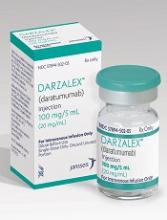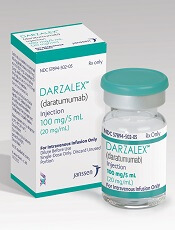User login
The drug is now approved for use in combination with lenalidomide and dexamethasone or bortezomib and dexamethasone to treat MM patients who have received at least 1 prior therapy.
Health Canada granted daratumumab priority review for this indication due to a high unmet medical need in patients with MM.
When a drug is granted priority review, Health Canada aims to complete its review of the drug within 180 days from the time an application is submitted.
Health Canada grants priority review to products intended for the treatment, prevention, or diagnosis of serious, life-threatening, or severely debilitating diseases or conditions.
About daratumumab
Daratumumab is a human IgG1k monoclonal antibody that binds to CD38, which is highly expressed on the surface of MM cells.
The drug is being developed by Janssen Biotech, Inc. under an exclusive worldwide license from Genmab.
Daratumumab received conditional approval in Canada last year.
In June 2016, Health Canada issued a Notice of Compliance with Conditions approving daratumumab for MM patients who had received at least 3 prior lines of therapy, including a proteasome inhibitor and an immunomodulatory agent, or patients who are refractory to both a proteasome inhibitor and an immunomodulatory agent.
Phase 3 trial data
Health Canada’s expanded approval for daratumumab is based on data from the phase 3 POLLUX and CASTOR trials.
In the POLLUX trial, researchers compared treatment with lenalidomide and dexamethasone to treatment with daratumumab, lenalidomide, and dexamethasone in patients with relapsed or refractory MM.
Patients who received daratumumab in combination had a significantly higher response rate and longer progression-free survival than patients who received the 2-drug combination.
However, treatment with daratumumab was associated with infusion-related reactions and a higher incidence of neutropenia.
Results from this trial were published in NEJM in October 2016.
In the CASTOR trial, researchers compared treatment with bortezomib and dexamethasone to treatment with daratumumab, bortezomib, and dexamethasone in patients with previously treated MM.
Patients who received the 3-drug combination had a higher response rate, longer progression-free survival, and a higher incidence of grade 3/4 adverse events than those who received the 2-drug combination.
Results from this trial were published in NEJM in August 2016. ![]()
The drug is now approved for use in combination with lenalidomide and dexamethasone or bortezomib and dexamethasone to treat MM patients who have received at least 1 prior therapy.
Health Canada granted daratumumab priority review for this indication due to a high unmet medical need in patients with MM.
When a drug is granted priority review, Health Canada aims to complete its review of the drug within 180 days from the time an application is submitted.
Health Canada grants priority review to products intended for the treatment, prevention, or diagnosis of serious, life-threatening, or severely debilitating diseases or conditions.
About daratumumab
Daratumumab is a human IgG1k monoclonal antibody that binds to CD38, which is highly expressed on the surface of MM cells.
The drug is being developed by Janssen Biotech, Inc. under an exclusive worldwide license from Genmab.
Daratumumab received conditional approval in Canada last year.
In June 2016, Health Canada issued a Notice of Compliance with Conditions approving daratumumab for MM patients who had received at least 3 prior lines of therapy, including a proteasome inhibitor and an immunomodulatory agent, or patients who are refractory to both a proteasome inhibitor and an immunomodulatory agent.
Phase 3 trial data
Health Canada’s expanded approval for daratumumab is based on data from the phase 3 POLLUX and CASTOR trials.
In the POLLUX trial, researchers compared treatment with lenalidomide and dexamethasone to treatment with daratumumab, lenalidomide, and dexamethasone in patients with relapsed or refractory MM.
Patients who received daratumumab in combination had a significantly higher response rate and longer progression-free survival than patients who received the 2-drug combination.
However, treatment with daratumumab was associated with infusion-related reactions and a higher incidence of neutropenia.
Results from this trial were published in NEJM in October 2016.
In the CASTOR trial, researchers compared treatment with bortezomib and dexamethasone to treatment with daratumumab, bortezomib, and dexamethasone in patients with previously treated MM.
Patients who received the 3-drug combination had a higher response rate, longer progression-free survival, and a higher incidence of grade 3/4 adverse events than those who received the 2-drug combination.
Results from this trial were published in NEJM in August 2016. ![]()
The drug is now approved for use in combination with lenalidomide and dexamethasone or bortezomib and dexamethasone to treat MM patients who have received at least 1 prior therapy.
Health Canada granted daratumumab priority review for this indication due to a high unmet medical need in patients with MM.
When a drug is granted priority review, Health Canada aims to complete its review of the drug within 180 days from the time an application is submitted.
Health Canada grants priority review to products intended for the treatment, prevention, or diagnosis of serious, life-threatening, or severely debilitating diseases or conditions.
About daratumumab
Daratumumab is a human IgG1k monoclonal antibody that binds to CD38, which is highly expressed on the surface of MM cells.
The drug is being developed by Janssen Biotech, Inc. under an exclusive worldwide license from Genmab.
Daratumumab received conditional approval in Canada last year.
In June 2016, Health Canada issued a Notice of Compliance with Conditions approving daratumumab for MM patients who had received at least 3 prior lines of therapy, including a proteasome inhibitor and an immunomodulatory agent, or patients who are refractory to both a proteasome inhibitor and an immunomodulatory agent.
Phase 3 trial data
Health Canada’s expanded approval for daratumumab is based on data from the phase 3 POLLUX and CASTOR trials.
In the POLLUX trial, researchers compared treatment with lenalidomide and dexamethasone to treatment with daratumumab, lenalidomide, and dexamethasone in patients with relapsed or refractory MM.
Patients who received daratumumab in combination had a significantly higher response rate and longer progression-free survival than patients who received the 2-drug combination.
However, treatment with daratumumab was associated with infusion-related reactions and a higher incidence of neutropenia.
Results from this trial were published in NEJM in October 2016.
In the CASTOR trial, researchers compared treatment with bortezomib and dexamethasone to treatment with daratumumab, bortezomib, and dexamethasone in patients with previously treated MM.
Patients who received the 3-drug combination had a higher response rate, longer progression-free survival, and a higher incidence of grade 3/4 adverse events than those who received the 2-drug combination.
Results from this trial were published in NEJM in August 2016. ![]()

